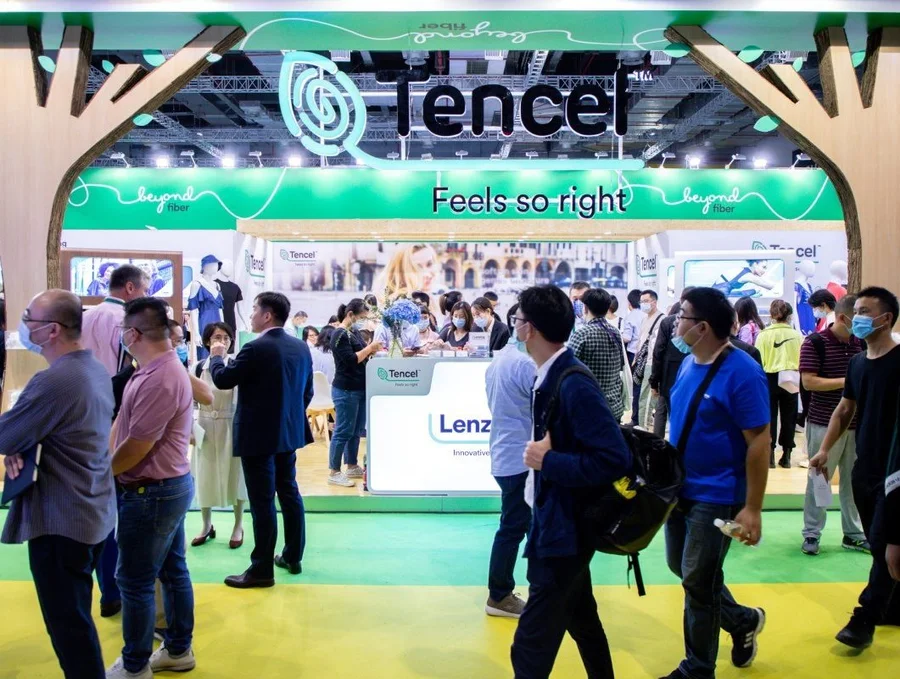The Lenzing Group, which has partnered with Calzedonia, Lacoste and Tommy Hilfiger offered sustainable innovation at the Shanghai Intertextile Apparel fair.
From 27-29th of August it was the 30th Anniversary of the Shanghai Intertextile Apparel Fair, a dedicated sourcing platform for manufacturers to showcase their sustainable apparel, textiles and accessories.
Featuring nearly 4,000 exhibitors from 26 countries, there was plenty for the event’s 100,000 visitors to see, as they explored a diversity of innovative products designed for the fall/ winter 2025-26 season.
The fair sought to highlight the powerful possibilities of digitalisation and sustainability, with experts at the Econogy Hub and Digital Solutions Zone discussing testing compliance to the potential of generative AI in textile design.
The fair has seen an extraordinary rise in attendance, with a 29% rise in international buyers at this edition after overseas visitors doubled in spring. All this is down to the desire in both China and the rest of the globe for sustainable reform in fashion manufacturing.
The fair sought to highlight the powerful possibilities of digitalisation and sustainability, with innovative additions such as the Ecology Hub, Digital Solutions Zone and events focusing on specific global market trends.
As of 2019, China is the biggest clothing manufacturer in the world, with about 24,000 enterprises and around eight million employers. The sector employs more than 20 million Chinese people and creates more than 10 million jobs for migrant workers every year.

When talk turns to the problems of the garment and textile industries, like unsustainability and labour violations, our heads inevitably swivel to face notorious Chinese E-commerce giants like Temu or Shein. Included in this group are the many global fashion manufacturers guilty of the same that take their operations to the country.
But we mustn’t overlook the many solutions coming out of China as well, a country where sustainability is a growing concern.
In the Chinese Government’s ‘Outline Of the Development of the Textile Industry during the 14th Five Year Plan’ they lay out policies that directly promote and encourage the acceleration of low-cost, functional and sustainable renewable fibres in the local textile industry.
Sustainability is a growing market concern in China too, with 90% of the consumers interviewed in a recent CottonWorks survey saying they want their home textiles to be environmentally friendly.
Manufacturers like the Lenzing Group, which shone at the 30th Anniversary fair, are meeting these desires for greater sustainability both in China and beyond.
The Lenzing Group
Lenzing is an Austrian brand widely known for its ecologically responsible production of speciality fibres made from renewable raw material wood. It partners with some of the biggest fashion and textile manufacturers in the world, from H&M to Levi’s to ASOS.
Lenzing has four key products: Tencel, Lenzing EcoZero, Veocel and Lenzing. All four of these products deploy sustainable materials and approaches to help create the future of eco-conscious textiles.
At the Shanghai Apparel fair, Lenzing gathered seven of its local downstream supply chain manufacturers to showcase their renewable products. This was in addition to Lenzing’s satellite pavilion at the event where it showcased its own innovative green home textile materials.
Lenzing Group introduced the first Carbon-zero TENCEL™ fibres which are CarbonNeutral™ certified products by Natural Capital Partner.
“Since introducing TENCEL™ Lyocell in 19925 and bolstering the overall brand positioning in 2018, TENCEL™ has been striving to bring innovative, sustainable textile fibres to the world,” says Eva McGeorge, Senior Director of Global Marketing and Branding, Commercial Textiles at Lenzing AG.
“The latest TENCEL™ brand evolution expands on our vision to spearhead resource-efficient4 and circular business practices, attributed to our fibres, from raw material sourcing to end-of-life disposal of consumer products.
“To facilitate real change in the value chain, everyone in the industry needs to transform together”

The brand is focused on a deep-seated respect for nature. The TENCEL™ brand is made from regenerated biodegradable fibres, carefully sourced from sustainably managed forests and produced using resource-efficient methods.
From the first waterless dyeing technology for wood-based cellulosic fibres to the first plastic-free alternative for stretch fabrics, TENCEL™ has been a catalyst in the revolution of fibre processing and applications.
Materials like cotton waste and orange peel have been experimented with by Lenzing to enhance circularity further, showcasing the company’s unwavering commitment to championing sustainable textile innovation.
“When consumers see the TENCEL™ trademark, they can rest assured that they are choosing renewable, traceable fibres that guarantee quality and comfort,” says Kit Ping Au-Yeung, Executive Vice President of Global Textiles Business at Lenzing AG.
“As we foster fibre innovation, we will continue to bolster trust and collaboration with like-minded partners, to empower value chain customers and amplify our impact.
“We will also further refine our fibre identification technologies and Lenzing E-Branding Service offerings, to make transparency and traceability a norm across various stages of textile production.”



